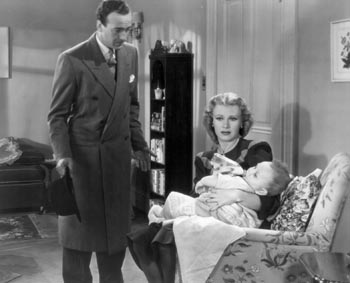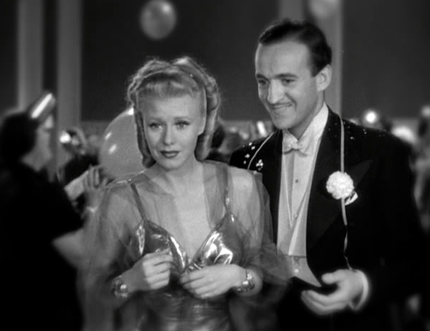
 |
|
|
|
Ginger Rogers' Hollywood career first peaked when she and Fred Astaire became the dance sensation of the 1930s. And when that vein of classic gold thinned out, the actress turned to non-musical dramatic and comedy roles, coming up just one year later with an Oscar for Best Actress in the drama Kitty Foyle. One of her first post-Astaire efforts is the nearly perfect light comedy Bachelor Mother, from that much-celebrated year 1939. Directed by Garson Kanin from a script by Norman Krasna, this show has all of its ducks in a row in more ways than one. That it's not instantly remembered all that well today can only be because much of the RKO library from this era has been under-exposed. Not quite qualifying as a screwball comedy, Bachelor Mother takes a number of familiar situations and makes them seem completely fresh. At Merlin's department store, toy department sales clerk Polly Parrish (Rogers) gets a pink slip -- she was just hired for the pre-Christmas rush, helping to sell wind-up Donald Duck toys. On the street she sees a woman leaving a baby on the doorstep of an adoption home, and rushes to console it. The adoption people assume she's the mother. The social worker in charge rushes right over to Merlin's and appeals to David Merlin, the owner's son (David Niven) to re-hire Polly so she can support her child. Polly's objections are ignored, as both the adoption agency and David are convinced she's the mother. Considering that the responsibility comes with a job and a raise, Polly gives in and accepts the baby. Of course, David's interest in the child and the mother begins to grow, and David takes Polly out on the town to celebrate a wonderful New Year's Eve. Thanks to an irate employee, David's father J.B. Merlin (Charles Coburn) learns about the baby and assumes that it is his illegitimate grandson. Overcome with emotion at finally being a grandfather, J.B. now expects David to "do the right thing" by his secret family. 
That synopsis doesn't seem all that special, yet Bachelor Mother is a delight from beginning to end, thanks to Norman Krasna's mischievous screenplay. The film teases the Production Code's attitude toward the sanctity of motherhood while scoring points on the narrow gender role afforded working women. Polly Parrish is so hard up for money that she'll enter an exhausting swing dance contest with the toy department's stock room boy. Her plans are thwarted, first by the adorable but inconvenient baby, and then because they win first prize -- a loving cup instead of cold cash. The meddling adoption officers and David honor motherhood by forcing the institution onto poor Polly, who does her best to resist the charms of the film's bouncing baby of joy (played by an 'actor' who should be 72 this year!). The movie gets good mileage from Polly's initial reluctance to get stuck with the hot potato infant, an attitude not usually seen in the movies, at least not in likeable characters. We also experience Polly's frustration at being patronized by well-meaning meddlers that assume she's an unmarried mother and are determined to make her do the right thing. In 1939, the average Hollywood movie made use of babies as sentimental glue to hold a family together or to wring tears from the audience. Bachelor Mother portrays "getting stuck" with an infant as a source of humor, a liberating idea, to say the least. I'll bet that the studio had some very illuminating discussions with the Code Office about the merits of this concept. Screenwriter Krasna has a dead-on understanding of workplace politics. If stock room boy Freddie Miller (Frank Albertson of It's a Wonderful Life) would just mind his own business, he'd get his promotion to assistant floorwalker and do well. He instead decides that he can blackmail his way to a better job by confronting David with his secret baby. Everybody who learns about the baby jumps to the conclusion that Polly and David have done the deed. The spoiled rich playboy David is unhappy when one of the Donald Duck toys breaks in his hand. (As Disney films were at this time distributed by RKO, the metal duck is serious product placement cross-pollination.) David wants to return it to the store, whereupon Polly mocks him with a laugh: "Ha-ha!" Another sales clerk gives David the same sardonic laugh when he repeats his intention. The employees know darn well that the return desk will refuse the return without a receipt, and the furious David gets caught trying to shoplift some of his own merchandise. 
Of course, Polly's date with her boss has its plus side -- when New Years' rolls around and David calls on Polly at the last minute, he can have his employees round up everything she needs right off the display mannequins -- gown, shoes, fur coat, accessories. If that isn't an underpaid working girl's fantasy, nothing is. For once a Hollywood movie explains where all the designer clothing comes from -- Polly becomes Cinderella for a night. Many of Bachelor Mother's best laughs are derived from various babes-in-arms situations. They've picked a truly cute, curious little squab to play Polly's foundling, and his enormous, curious eyes are forever darting between the actors during dialogue scenes. There's so much integration of baby into dialogue scenes that we have to applaud the patience of director Kanin and his cast -- this particular kid is the most cooperative baby in film history. Was it really triplets? The movie does pull a Hollywood cheat when Polly's landlady, the sweet Jewish mom played by Ferike Boros, volunteers to babysit at all hours. It looks like she's going to practically raise the child, just for the love of it. Parents that were/are fortunate to have such a wonderful neighbor, please raise your hands. I didn't think so. Krasna gives Rogers some really bright dialogue. When Polly shows up at the toy counter looking exhausted, she explains that the process of getting up to tend to the baby all night long was like a nightmare that goes on and on and on for hours, "and before you know it, you're winding ducks." Rogers is adorable but there's something about David Niven that keeps him from shining as top star material, even though he does everything right in his part as the befuddled playboy. Perhaps that was all for the best. Niven would maintain his graceful star career the same way, never peaking, never burning out, but remaining a dependable charmer over a career spanning 35 years. Some of the film's biggest laughs go to Charles Coburn, a disapproving father who becomes a softie when convinced that he has a grandson... "who looks just like me!" 
The film's overarching joke is that the central misunderstanding is never cleared up -- there's no screwball resolution with a confused judge, and no humiliating scene of confession followed by forgiveness. We can almost see the film's author's grinning as David and Polly simply give up and accept the instant family that has been imposed on them from without -- through the modern miracle of virgin birth? Ha-ha! Norman Krasna would go on to write more exceedingly clever and winning light comedies, like the wartime romance Princess O'Rourke. He was a master of the art of mistaken identity. One of his funniest scripts came two years later, with The Devil & Miss Jones, which also takes place in a big department store. Charles Coburn again plays the owner, who becomes an undercover employee in his own store to find out how the little people live. Bachelor Mother was remade in 1956 as Bundle of Joy with Debbie Reynolds and Eddie Fisher. 
The Warner Archive Collection DVD-R of Bachelor Mother is a good but not sensational transfer of this wonderful picture. The very popular movie was heavily printed and reissued after its initial release, leaving Warners with less than optimal elements. The sound is fine and the picture mostly sharp and unblemished, but it falls a bit short of the snap that we notice with less famous films, whose printing elements have been snoozing undisturbed in quiet vaults for sixty and seventy years. The disc carries no extras.
On a scale of Excellent, Good, Fair, and Poor,
Bachelor Mother rates:
Reviews on the Savant main site have additional credits information and are often updated and annotated with reader input and graphics. Also, don't forget the 2010 Savant Wish List. T'was Ever Thus.
Review Staff | About DVD Talk | Newsletter Subscribe | Join DVD Talk Forum |
| ||||||||||||||||||